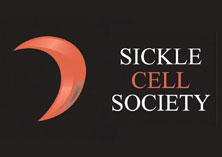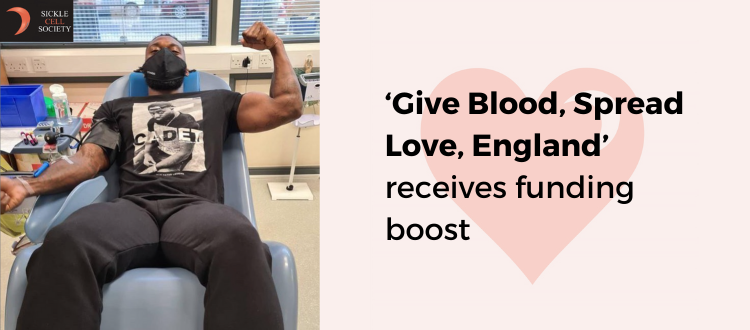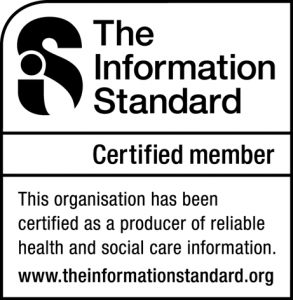‘Give Blood, Spread Love, England’ Receives Funding Boost
‘Give Blood, Spread Love, England’ receives funding boost to help tackle health inequalities and promote blood donation amongst Black communities
The Sickle Cell Society’s ‘Give Blood, Spread Love, England’ project has received £19,947 funding as part of the Government’s commitment to tackle health inequalities in Black communities.

The announcement of the funding aptly comes on World Kidney Day (March 11) and aims to address the shortage of organs, particularly kidneys, for those waiting for a transplant from all Black, Asian, mixed heritage and minority ethnic backgrounds. Whilst also highlighting the need for more blood donors from a black background, whose blood is used to treat patients with conditions like sickle cell.
The Community Investment Scheme, which is led by NHS Blood and Transplant, will fund local organisations to drive awareness, understanding and behaviour change. Having previously only focussed on promoting organ donation, the scheme has now been opened to include projects which also highlight the importance of blood donation, like the ‘Give Blood, Spread Love, England’ project.
For the first time, NHS Blood and Transplant opened up the Community Investment Scheme to include projects and organisations to include blood donation. This was to develop grassroot connections and work with trusted voices and organisations who can help address barriers and normalise blood donation within Black African and Black Caribbean communities.
Tracy Williams, (Project Manager, Blood Donation – Sickle Cell Society) said:
“After a successful two years raising awareness of blood donation and recruiting black-heritage blood donors under our ‘South London Gives’ project, Sickle Cell Society is pleased to have the opportunity to continue this work nationally via ‘Give Blood, Spread Love, England’”
 Sickle cell is currently the fastest growing genetic disorder in both the UK and the wider world. People from Black African or Black Caribbean backgrounds are most likely to have this condition which can often require frequent, life-saving blood transfusions. For those reliant on regular transfusions, it is essential that they receive blood matched as closely as possible to their own. A match is most likely to come from a donor of the same ethnicity, yet currently only 1.5% of donors in England are Black. This January has seen a record number of blood donor registrations from the Black community but twice as many are still needed to meet the growing clinical need.
Sickle cell is currently the fastest growing genetic disorder in both the UK and the wider world. People from Black African or Black Caribbean backgrounds are most likely to have this condition which can often require frequent, life-saving blood transfusions. For those reliant on regular transfusions, it is essential that they receive blood matched as closely as possible to their own. A match is most likely to come from a donor of the same ethnicity, yet currently only 1.5% of donors in England are Black. This January has seen a record number of blood donor registrations from the Black community but twice as many are still needed to meet the growing clinical need.
There is also an increased demand for some rare blood subtypes, such as Ro, that are more common in Black people. More blood donors from a Black background are needed as these subtypes are important when someone has regular transfusions as they need blood that matches their own as closely as possible to reduce the risk of potentially life-threatening transfusion reactions.
“Using our deep connections with black-heritage communities and our significant online presence and engagement, we will build upon our existing support from celebrities, influencers, clinicians and the sickle cell community to keep sharing our message that black-heritage blood donors are needed and that giving blood has a positive and powerful impact on blood donors and recipients.
We will keep pushing forward with our goal to recruit new, young blood donors and to share our message with our target communities. We will demystify the blood donation process, challenge myths about giving blood and support more black-heritage people to join the blood donation register, helping to ensure that sufficient ethnically matched blood is available to improve and save the lives of people living with sickle cell disorder.” Tracy Williams, Project Manager – Blood Donation, Sickle Cell Society
Since its launch in 2018, the Community Investment Scheme has supported 43 organisations to deliver 50 community-led projects. With around 4,000 people engaging in conversation or taking away a leaflet or information on the importance of organ donation and 8,000 attended a talk or workshop.
There is hope that the introduction of Max and Keira’s Law – the new law relating to organ and tissue donation in England – which came into effect on 20th May 2020, will lead to an increase in the number of donors of all ethnicities. However, families will still be consulted before donation goes ahead so it remains essential to raise awareness, challenge misinformation and encourage those supportive of organ donation to talk with their families.
Altaf Kazi, Head of Faith and Belief Engagement at NHS Blood and Transplant, said:
“Through the Community Investment Scheme we have seen first-hand the abilities of trusted individuals and community groups to prompt conversation, tackle misinformation, educate and offer reassurance around organ donation and now blood donation. Often a person’s best donor match will share their ethnicity, but too many donation opportunities are missed because families haven’t discussed organ donation, and Black and Asian people are seriously underrepresented when it comes to donating blood.
We are asking more people from Black and Asian communities to find out about both blood and organ donation and help us to address the inequalities that many members of these communities may face. By giving your support you can help save lives.”
For more information about the Community Investment Scheme please visit https://www.nhsbt.nhs.uk/cis/ or contact: community.funding@nhsbt.nhs.uk
The Community Investment Scheme is part of a Government-funded campaign led by NHS Blood and Transplant with support from the National BAME Transplant Alliance (NBTA) to address the urgent need for Black, Asian and minority ethnic donors.





